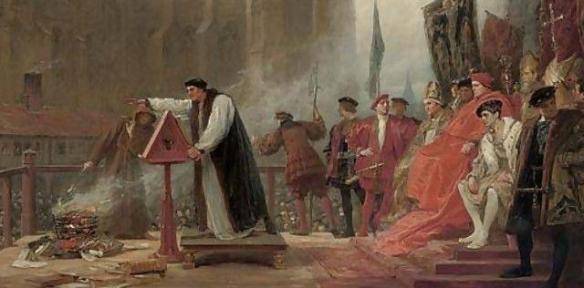Barth appeals to the primacy of Jesus Christ in all things. In one instance, in his Church Dogmatics, he is developing what it means to understand that Jesus is God’s ultimate plan for all of creation, all of history; which ultimately entails a disruption from all else, even as all else is taken up into the life of Christ as God’s history for the world. Here Barth is in the process of developing his treatment on such things, with particular reference to a doctrine of time vis-à-vis eternity. We will pick up with him mid-paragraph:
At any rate, as a human ministration it is related to the work of Jesus Christ in the same way as in the Old Testament the human act of blessing is related to the real word of blessing which has its power only from God, and which can therefore be uttered only by God Himself. However that may be, the birth of the Christian life “of water and of the Spirit (Jn. 3.5) signifies a direct relationship of the individual Christian to Jesus. He does not follow father and mother or the line of his ancestors, but, taken out of this succession, or at any rate in independence of it, he follows Jesus. He believes that there is one holy catholic Church, and that he may be a living member of the same. Yet he does not believe in the Church, but in the Holy Spirit, who is consubstantial with the Father and the Son. He does not therefore honour and accept the Church’s tradition and order in becoming a Christian and confessing himself to be such, but he places himself behind and confesses the beginning which all ecclesiastical tradition and order can only serve, and which he can now recognise and receive as his own beginning. He believes, thinks, speaks and acts therefore, not as the member of a so-called “Christian nation,” but in gratitude to the Lord that even in his—in no sense Christian—country He has community, by and to whose ministry among this people he himself is called.[1]
This kicks against some of the Christian zeitgeist online right now; which is an extreme turn into postmillennial theonomy. But these types of immanentist turns are exactly what the true Gospel confronts, contradicts, and brings an end to. In the Gospel there is a mediated immediacy, in Christ, to the living and triune God; one that allows the Christian person to live before God rather than anyone else. To find a ground for Christian identity in anything other than the immediate and direct life of God for the world in Jesus Christ is to collapse and thus conflate God’s ways with the contingencies and particularities of the accidents of history; in the sense that Christian identity, in such a frame, begins to predicate God’s ways and in-breakings upon an a prior set of foundations and structures that He has not laid in Christ, but that we have laid in the power of our wit, albeit in the name of Christ.
Barth isn’t saying that salvation history isn’t important, that the historic Church isn’t important, that the catholic creeds aren’t important; He is simply noting that they aren’t the ends or circumscriptions of the reality they are ostensibly pointing beyond themselves and to, in their respective reality, as is all of creation’s, in Jesus Christ. The point is, there is no authority that supersedes the viva vox Dei (voice of the living God); that there is only one authority for the Christian person, as an individual member in the body of Christ (I Cor. 12.27), and His name is, Jesus Christ. The Christian’s birthright isn’t through a nation, an ethnicity, a Christendom, a political party, a ‘blood and soil,’ or anything else. The Christian’s birthright has been seeded in the seed of God as that was given life by the hovering work of the Holy Spirt within the womb of Israel, within the womb of Mary to be sure, but these only as vessels for the ultimate and prime reality of all of reality who is Jesus Christ.
I have grown very weary of being confronted with supposed ‘Protestant’ ‘Reformed’ ‘Lutheran’ ‘Anglican’ ‘Baptist’ ‘Wesleyan’ et al. ad infinitum theologies that end up being nothing more than appeals to some type of socio-politico construct that has been ostensibly harvested from the past as its best repristination for the 21st century church. There is an oppressiveness about all of this to me that does not evince the Spirit’s presence, which is liberty. Indeed, we are a social and political animal as creatures, but our end is not defined, or should not be defined, by this type of extension into space and time. We have been born directly from above, alongside the Son’s freely elected humanity for us, within the womb of the Father by the Holy Spirit. And it is from whence that we have our whither and warp in this fallen and decrepit world. It is by the blood of Immanuel’s veins, quite literally, that we have life; no matter what state, country, or church tradition we inhabit; if indeed we have such life at all.
[1] Karl Barth, Church Dogmatics III/2 §47 [585] The Doctrine of Creation: Study Edition (London: T&T Clark, 2010), 146.
